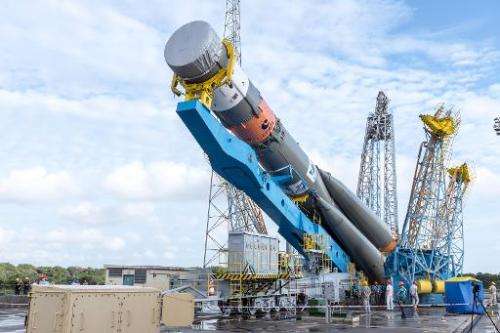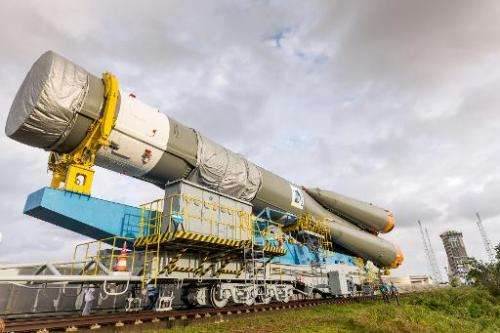Europe resumes Galileo satnav deployment (Update)

Europe resumed deployment of its beleaguered Galileo satnav programme on Friday, launching a pair of satellites seven months after a rocket malfunction sent two multi-million euro orbiters awry.
Galileo's seventh and eighth satellites blasted off from Europe's spaceport in Kourou, French Guiana, at 2146 GMT (6:46 pm local time), to join four orbiters already in the constellation.
Taken aloft aboard a Russian Soyuz rocket, the same type that malfunctioned last August, the pair entered their intended orbit three hours and 48 minutes later, as planned.
"I am delighted to announce that according to our onboard... system, Adam and Anastasia have been safely separated on their targeted medium-Earth orbit," Stephane Israel, chairman of the Arianespace launch company said in comments broadcast live on the European Space Agency (ESA) website early Saturday.
"It's been a full success!" he said to loud applause and much back slapping in the control centre.
Galileo will be a rival to the US GPS and Russia's Glonass satellite navigation systems, but unlike them, will be under civilian control.
Friday's launch is a crucial next step for a programme that has been plagued by technical problems, delays and budget questions.
The multi-billion-euro satellite navigation and search and rescue system will ultimately consist of 30 orbiters, including six spares, and is set to become fully operational by 2020.
Friday's launch had been scheduled for December last year, but was suspended pending a probe into the August 22 mis-launch which sent satellites five and six into an incorrect orbit.
They should have been slotted into a circular trajectory at an altitude of some 23,500 kilometres (14,600 miles), inclined at 56 degrees to the equator. Instead, they were placed in an elliptical orbit that saw them travelling as high as 25,900 km above Earth and to a low point of 13,713 km, not useful for navigation.
Both have since been manoeuvred into a better, more circular path, but it is still not clear whether they will ultimately form a useful part of the satnav programme.
'Six satellites per year'
Last year's hitch was blamed on frozen fuel pipes on board the Soyuz rocket's fourth stage, called Fregat.
Pipes containing hydrazine propellant had been placed too close to super-cold helium feed lines, investigators reported—a problem ESA says has since been fixed.

The launch of satellites five and six, meant to have been the first fully operational Galileo orbiters, had itself been delayed by more than a year due to "technical difficulties". The first four orbiters were launched in 2011 and 2012.
Satellites seven and eight should become operational by mid-year after in-orbit testing.
"The deployment of the Galileo constellation is restarting with this successful launch," ESA director general Jean-Jacques Dordain said in a statement Saturday.
Galileo programme director Didier Faivre told journalists earlier that the next launch was being planned for September, followed by another "at the very end of the year, or the very beginning of 2016".
"The idea is to have six satellites per year," he said.
The European Commission, which finances the project, hopes to have 16 satellites in orbit by end-2016 to start providing initial services—including applications for smartphones, in-car navigation and search-and-rescue location.
Galileo will be inter-operable GPS and Glonass, and is intended to provide better coverage at high latitudes.
The remaining satellites will be launched using a combination of Soyuz rockets, which can take two aloft at a time, and Europe's own Ariane 5 ES launcher, which can handle four.
Contracts have been signed for five Soyuz launches and three with Ariane 5 ES. The Galileo satellites have yet to pass compatability tests for launch on Ariane, however.
Five billion euros ($5.4 billion) were spent on Galileo up to 2014, and a budget of another seven billion euros has been approved until 2020.
The satellites themselves are valued at about 40 million euros each, and each launch with a Soyuz costs an estimated 65-70 million euros.
© 2015 AFP




















